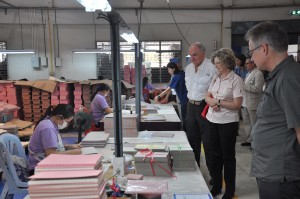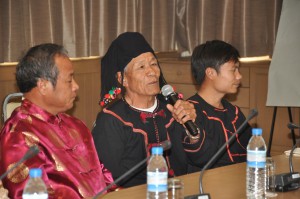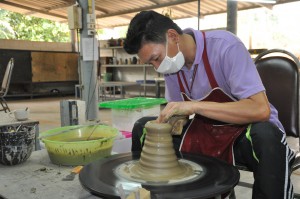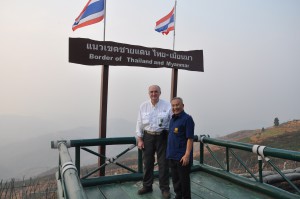Dreams and dramatic transformation in Doi Tung
Members of the IU delegation embarked early this morning on a weekend trip to Chiang Rai, the northernmost province of Thailand. Their specific destination: Doi Tung, a mountain in the Thai highlands area known as the “Golden Triangle,” where the borders of Thailand, Laos and Burma converge.
At an elevation of nearly 2,000 feet, Doi Tung offers spectacular views of Burma and Thailand, which IU President Michael McRobbie and his colleagues attempted to take in Saturday afternoon, but not before learning all about the remarkable history and impact of a sustainable development project founded almost 30 years ago under royal patronage and now spearheaded by one of IU’s most successful Thai alums.

IU President McRobbie, Idie Kesner, dean of the IU Kelley School of Business, and Associate Vice President for International Partnerships Shawn Reynolds tour the mulberry paper factory in Doi Tung.
For many years, Doi Tung was one of the world’s leading regions of illicit opium production. By the late 1980s, the secluded mountainous watershed area, spanning 15,000 square kilometers and impacting 11,000 people in 29 villages, had been almost thoroughly devastated by slash and burn agriculture, opium cultivation, and human and arms trafficking. The residents of the region, comprising six ethnic groups that did not possess Thai citizenship, lived in abject poverty (with an annual per capita income of just over $100) and benefited from little to no government or infrastructure support. Armed groups occupied numerous parts of the area, which made it supremely challenging for government officials to deliver any aid or assistance to the local residents.
By 1987, less than 30 percent of the natural forest in Doi Tung remained, and it was this barren hillside that the late Princess Srinagarindra, a member of the Thai royal family who the hill residents called Mae Fah Luang or “The Heavenly Royal Mother,” encountered during one of her many visits to northern Thailand.
(Appropriately, IU delegation members made the trip today to Chiang Rai as Thai citizens across the country celebrated the birthday of Her Royal Highness Princess Maha Chakri Sirindhorn, to whom IU bestowed an honorary degree in 2010, in recognition of her efforts to expand and improve public education all across Thailand, especially in remote and rural areas.)
For several years prior to finding Doi Tung in its difficult state, Princess Srinagarindra had made it her mission to address the poverty and poor living conditions facing minority groups in Northern Thailand, leading to the establishment, in 1972, of the Mae Fah Luang Foundation. The MFLF’s first comprehensive development project, the Doi Tung Development Project, was born in 1988 with a goal of providing the people of this ravaged region, many of whom knew nothing else but opium cultivation and, even worse, opium addiction, with improved health and more meaningful livelihoods.
The project aimed to create self-sufficient communities that would become independent of external support or, in the Princess Mother’s words, “to help the people so they can help themselves.” To this end, it called for a multi-pronged approach based on recruiting community development volunteers from all 29 villages in the region; restoring residents’ sense of belonging to the area; arranging for better work alternatives to opium, such as reforestation, handicrafts and tourism; and maximizing local resources and transferring them into quality products that would generate new sources of income.
Since the MFLF’s visionary beginnings, the project has delivered nothing short of a sensational transformation here in Doi Tung. In the early 1990s, a 1,000-day rehabilitation program worked to assist many of the nearly 500 area residents addicted to opiates; its relapse rate was a low 15 percent, and today local communities assume responsibility for much of the drug rehabilitation effort. Forest coverage has risen to 90 percent of the total project area, and opium is no longer grown.
In 1989, the average local income for an individual was $120 a year. By 2011, the number had increased to almost $1,400 a year and, on average today, a household earns more than $9,100 a year. Total income from agricultural land increased about three-fold over a 10-year period, from just under $389,000 in 1988 to about $1.2 million in 2007, even as the total agricultural area was reduced, due to reforestation efforts, from 58 percent to approximately 11 percent.
Furthermore, today about three-quarters of the population has been granted Thai citizenship, up from only 38 percent in 1992, and many children and grandchildren of the older generation of Doi Tung residents attend school and, increasingly, go to college.
An innovative IU alum, inspiring local stories
Ensuring that the MFLF continues its dramatic impact on the health and well being of Doi Tung residents and moves forward to meet the evolving needs of the region is IU alumnus Disnadda Diskul. Diskul, who received his bachelor’s degree in business administration from IU Bloomington in 1964, has been involved with MFLF since its start and now serves as chairman of the Doi Tung Development Project. He has also been awarded His Majesty the King’s “Mahidol Memorial Award” for his outstanding work in development and social welfare.
At once passionate, outspoken, charming and determined, Diskul has overseen major growth within the foundation. Today, the MFLF boasts an annual income of $13 million and 600 employees, and it has been financially self-sustained for 15 years. In nearly that same span of time, the foundation has launched several more major sustainable development projects, extending its people-centric model into Afghanistan, Indonesia and Myanmar.
Under Diskul’s leadership, the MFLF has transitioned into what one might describe as an industry excellence center. As part of its effort to identify new environmental resources and translate them into income-generating products, the foundation has succeeded in the production of quality hand-woven fabrics, mulberry paper products and ceramics, many of which are sold by multinational corporation IKEA, as well as Doi Tung brand coffee sold in stores and branches across Thailand, and macadamia products, also sold throughout Thailand. All of these items are created in factories and plants here in a thriving cottage industry and outlet center here in Doi Tung that remarkably combines old village craftsmanship with modern production techniques.
Diskul led President McRobbie and others through the industry and outlet center this morning and into the afternoon, stopping for lengthy periods at each of the product production areas (and, yes, for some welcome sampling of the delicious macadamia nuts and coffee). It was almost unfathomable to think that not long ago, many of the men and women responsible for this thriving industrial sector were contributing to the destruction of their homeland — in the only way they knew to earn a livelihood for their families — by cultivating opium and engaging in other illicit activities.
Seeing these workers in action would have caused enough eye-opening and mind-racing for one day. But hearing the personal stories of several former opium growers and arms dealers was simply awe-inspiring. Each of these stories was astounding and delivered with such passion and pride, so much so that they’re almost too hard to put into words.
They told about growing and selling opium for 25, 50, almost 60 years, and becoming addicts themselves. They told about growing up where there were already no trees and nothing but opium fields. They also told about living in constant fear of the constant fighting between the drug lords and government authorities, which often resulted in the destruction of entire villages.

Several ex-opium growers shared their stories and the impact that the Doi Tung Development Project has had on their lives.
Through the aid and support of the Doi Tung project they persevered and now they are all living better, more successful and healthier lives. One older gentleman, addicted, sad and alone, and without money to support a family for decades, said he had been able to defeat his addiction and start a family, which includes a wife and two children. Another older man, also a longtime opium harvester and addict, today has five children, four of whom have received university degrees, and he himself has gone to school to get a general education degree. A woman who grew up to follow in her father’s footsteps as an arms trader, confessed she didn’t trust the Doi Tung project at first. She feared that she and others who participated in the initiative might be rounded up by government authorities and taken away from an area that, despite its ravaged state, was home. Today, she serves as a health volunteer in the community and is a proud Thai citizen who has traveled to several foreign countries and dreams of someday traveling to the U.S., even if, as she joked in her hill tribe dialect, it “happens in another lifetime.”
As much as it would be wonderful to welcome her to Bloomington one day, more likely it will be a new generation of Doi Tung residents that seize the opportunities that will present themselves as the region becomes economically stronger, healthier and more self-sustaining. With more financial resources and better health, people here will want to pursue newer, bigger aspirations, which is why MFLF is constantly reaching out to residents, seeking to understand their needs and desires. This changing reality is reflected in the foundation’s efforts to move promising employees into supervisory/management roles; in the grassroots efforts that have led some factory, plant and agricultural workers to launch products, thus becoming entrepreneurs themselves; in a new camp for “city kids that exposes them to rural living; and a more general effort to turn Doi Tung into what foundation leaders call a “living university” or “corporate classroom” that brings people from around the world to the region to learn from local villagers and engage in hands-on activities.
This last initiative may even serve to extend the connection between IU and Doi Tung beyond Diskul’s involvement as IU leaders from the Kelley School of Business, School of Public and Environmental Affairs, College of Arts and Sciences and IU Alumni Association are here this weekend to explore possible collaborations with MFLF that could lead to student internships, faculty research projects and international service learning experiences.
In any event, even on a cloudy day in Chiang Rai that took a little away from an otherwise superb trip up the spirally hillside to the Thai-Myanmar border, it was clear to see that the inspiring efforts here in Doi Tung will continue to have a profound impact on the quality of life here in this remarkable region of Thailand.
Tags: Chiang Rai, College of Arts and Sciences, Disnadda Diskul, Doi Tung, Doi Tung Development Project, HRH Princess Maha Chakri Sirindhorn, IU Alumni Association, Kelley School of Business, Mae Fah Luang Foundation, MFLF, Michael A. McRobbie, Myanmar, opium, Princess Srinagarindra, School of Public and Environmental Affairs, Thailand




